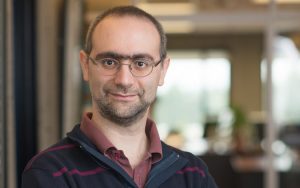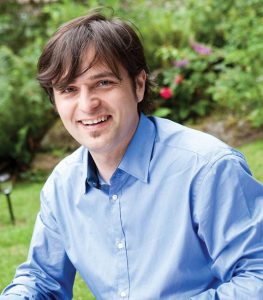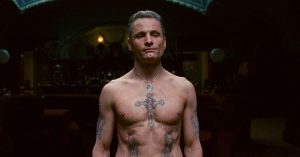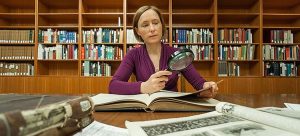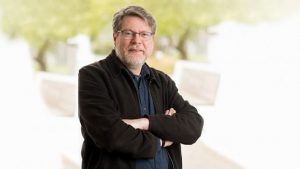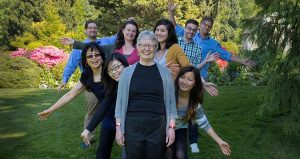Meet BA ’07 Lisa Davidson: Witnessing Cambodia
While many students spend their summers backpacking through Southeast Asia, Lisa Davidson traveled to Cambodia for an entirely different reason — she wanted to learn about children’s rights and labour, not from a textbook, but in the flesh.
Meet Dr. Mauricio Drelichman: Helping Economics students use research positions to get ahead
Economics professor Mauricio Drelichman believes undergraduates make excellent research assistants.
“I have had much better results in many cases with undergraduates,” Drelichman said, “Graduate students do not need to be research assistants to go to bigger and better places; undergraduate students are really hungry for these opportunities.”
Drelichman believes undergraduates are not given enough consideration for research assistant positions. “A lot of [positions] just require clear thinking and attention to detail,” he said, explaining these are skills most undergraduate students already possess.
“It’s amazing with undergraduates because they really get involved. They do a great job because the motivation is stronger.”
Anthony Wray, Honours History and Economics, and Yamila Simonovsky, Honours Economics, had the chance to work with Drelichman on a number of his research projects before they graduated this May.
“The first task that he’s given me is to go through secondary sources on his research related to Philip II in Spain and record any references to military expenditures,” Wray said, explaining he was also required to calculate exchange rates of the many currencies and coinage he was dealing with.
The project Wray is working on has to do with researching the beginnings of sovereign debt. Drelichman believes it to have begun during Philip II’s reign, and is using Wray’s record of military expenses in collaboration with Philip II’s demands for funding to explain its origin.
Wray started working with Drelichman in March and will continue until August. Drelichman is using the funds he received from the Arts Undergraduate Research Award (AURA) to finance Wray’s position. He believes the AURA should be used exclusively to employ students in research positions.
“I have my own grants for my work,” Drelichman said, “This way I can give students the opportunity to participate in research.”
“The AURA award has a huge impact as it […] makes faculty think of undergraduates.”
Simonovsky has worked on several projects with Drelichman. Her most recent task involved comparing a list of modern Spanish cities with a 16th century census. Simonovsky matched cities from the census to modern cities and recorded the population, a task that sometimes required her to use Google maps.
The research Simonovsky conducted helped Drelichman study the impact of Spanish nobility on economic activity. Using her updated lists of Spanish cities, he measured changes as related to the proportion of nobles.
Drelichman aims to make his research positions as meaningful as possible for the students involved, and play to their strengths.
“I involve them in key parts of the research,” he said, “I don’t assign menial tasks like photocopying.”
Simonovsky and Wray were given their opportunities after previously approaching Drelichman in hopes of being employed in research. Although he had no positions available at the time, Drelichman kept the students in the back of his mind. When positions freed up, he immediately thought of Simonovsky and Wray.
“It’s very important that students approach professors if they want to work with projects.” Drelichman asserted.
He also mentioned that these students were given opportunities to work with faculty members at other universities that needed research done in Vancouver. Simonovsky was involved in a project managed by a colleague of Drelichman’s that compared the prices of Safeway in the United States to those in Canada.
Simonovsky and Wray’s research experience came in handy when they were writing their theses, and helped prepare them for their upcoming endeavours in graduate school.
“Both of us are going to grad school in economics,” Wray said, “From that point of view it looks good; but more than that, […] you get that experience working on an intense research project.”
Drelichman was adamant that the best preparation for graduate school comes from experience in research.
“Grad officers have a difficult task identifying people that would produce good research,” Drelichman said from his personal experience as a graduate admissions officer.
Drelichman explained that excellent marks in undergraduate courses do not necessarily indicate that a student is ready for graduate studies: “[Graduate school] is about who can independently formulate and carry out a research project.”
“When you get an admission letter that says this person has research experience, it’s a sure win for admission,” he said.
“Experience speaks more than any transcript or standardized test.”
By Meghan Roberts (BA 2008, English Literature and International Relations).
Meet Postdoctoral Fellow Stefan Dollinger: Putting English students in the lab for the Dictionary of Canadianisms
UBC Postdoctoral Fellow Stefan Dollinger is taking English students out of the classroom and placing them into the lab as he heads the revision of the Dictionary of Canadianisms.
The project will be the first of many to come out of the Canadian English Laboratory and aims to provide an updated version of the Dictionary of Canadianisms on Historical Principles (DCHP2). Published in 1967, the first edition was not consistently maintained, leaving it outdated. Dollinger hopes to update the Dictionary while adding new entries from the last 40 years.
The team behind the second version of the Dictionary of Canadianisms has already discovered several new “Canadianisms”, or words and phrases that are unique to Canadian English. There are even some examples of words that originated on the UBC campus.
They’ve found that the oldest citation of the word “creamo” dates back to a 1925 version of the Ubyssey newspaper. Similarly, the drink “Brown Cow” was traced back to a 1976 edition.
Dollinger, who is involved in many research projects with the Canadian English Laboratory, hopes for the success of the Dictionary to be widespread. He aims to make the Dictionary available to Canadian universities and libraries to ensure the general public has access.
The Canadian English Laboratory employs many volunteer and paid student workers, including third year English honours student Sam Chung, and fourth year English Language student Cicily Cooper.
“I’m a research assistant in the Canadian English Language Lab,” Cooper explained, “We ‘harvest’ citations from periodicals we get through huge databases and find words that are Canadianisms.”
“I’ve even found some from the 1700s and 1800s!” Chung said. “We enter the words into the Bank of Canadian English and that’s pretty much it.”
Chung and Cooper both got involved with the project after taking Dollinger’s English 229 class on Canadian English words. Students in the class were asked to research Canadian words for a project; those that did well were given the opportunity to volunteer or work with Dollinger in his lab. Dollinger tries to include some work with the Bank of Canadian English in most of his courses.
Cooper and Chung excelled in their positions and were given paid part-time positions for the summer.
In addition to working with the Dictionary, Chung and Cooper were able to present their research at the Multidisciplinary Undergraduate Research Conference (MURC) last year. They were part of a five person student research team that worked with Dollinger to create a presentation for the conference. Their panel was one of only two groups presenting research in English, which Chung thinks is a shame.
“People have a mentality that research is exclusively reserved for sciences,” Chung said, “MURC was predominantly Science students with the odd Arts students who were mostly from Psychology.”
“I really want to see more Arts students presenting!”
Chung cites Dollinger’s help in the MURC as invaluable, and is grateful for the close relationship they have developed.
“He taught me everything step by step; he’s really caring.” Chung said, “The thing about Professor Dollinger is that he uses students as instruments of research so you’re not just working under him, you’re working alongside him.”
“I’m very indebted to him,” Chung added.
Cooper enjoys being a part of something that hasn’t already been studied in a classroom.
“As an undergrad you rarely feel like you’re a part of something new and different,” Cooper explained. “That’s what’s cool about being in research. I’m finding things that haven’t been found before.”
“I think it’s helped me realize all the opportunities that are out there and feel less limited. Doing this research has made me see there’s more than I can imagine!”
By Meghan Roberts (BA 2008, English Literature and International Relations).
Meet Film Studies student Dax Sorrenti: Invisible Canada – Canadian film abroad
Undergraduate student Dax Sorrenti explores international perception of David Cronenberg’s film Eastern Promises. Sorrenti, a film studies major, is using the popular movie to gauge international opinion of Canadian film. For his research, he studied reviews to see if they mentioned any Canadian elements.
Meet Professor Mary Chapman: Pioneering American suffrage literature research
Associate Professor Mary Chapman won the 2006 Yasuo Sakakibara Prize from the American Studies Association for an essay on writer Sui Sin Far, believed to be the first Eurasian to publish in Canada and the United States.
The paper is part of a book-in-progress on American suffrage literature, and examines Far’s work during the Progressive Era, a period of reform from the 1890s through the 1920s that saw many Americans push for social justice, general equality, and public safety.
Separated from her two-year-old son for nearly a year, a Chinese mother sacrifices everything to get him back. After spending her life’s savings to hire a lawyer, the woman is reunited with her child. But he no longer remembers her, or their native tongue.
She can’t believe that the government would take away her child in what she thought would be “the land of the free.”
The story — entitled “In the Land of the Free” — was published in 1912 in Mrs. Spring Fragrance, a popular short story collection by Sui Sin Far, pen name of British-born writer Edith Maude Eaton (1865 – 1914).
The story collection reflects the struggles and joys in the daily lives of Chinese families in North America. Far, who lived in Montreal and later moved to San Francisco and Seattle, depicts the anguish of Chinese immigrants, and the suffering inflicted by discriminatory immigration laws.
Associate Professor Mary Chapman, who teaches in the Department of English, recently won the 2006 Yasuo Sakakibara Prize from the American Studies Association for an essay she wrote on the pioneering writer.
Chartered in 1951, the American Studies Association has more than 5,000 members, including teachers and other professionals, concerned with American culture.
Prof. Chapman’s paper is part of a book-in-progress on American suffrage literature, and examines Far’s work during the Progressive Era, a period of reform from the 1890s through the 1920s that saw many Americans push for social justice, general equality, and public safety.
Among other things, the progressive movement called for the humane treatment of mentally ill people, worked for the organization of unions, and gave citizen women in the United States the right to vote by 1920.
Prof. Chapman probes into Far’s awareness of the shortcomings of the Progressive Era and the exclusion of Chinese immigrants from fundamental rights.
“At the very same time that they were advocating greater access to government, and votes for women, they excluded the Chinese from immigrating,” Prof. Chapman says.
Born to a Chinese mother and a British father, Far began her career at The Montreal Star and wrote one of the first public statements in opposition to the Chinese Head Tax in Canada. She wrote numerous articles and stories, which appeared mainly in American newspapers and magazines.
Prof. Chapman has found new material through what she calls intense digging in Far’s life. After searching for works not included in “Mrs. Spring Fragrance,” she has found articles showcasing the writer’s interest in China’s efforts to change outdated laws.
The enfranchisement of women in a Chinese province in 1912, while progressives in the U.S. were still campaigning for women’s right to vote, exposed the limits of American efforts to reform, says Prof. Chapman.
“So all of a sudden, this culture, which even the most progressive-minded Americans had perceived as inferior and backward, had given their votes to women,” she says.
“Far was very supportive of the Chinese reform movement which had, as one of its goals, the enfranchisement of Chinese women,” she adds. “She took great delight in showing how liberated Chinese women were.”
Prof. Chapman believes it was clear to Far that the progressive movement had an exclusive agenda. The writer’s “In the Land of the Free” pinpoints just that.
The story simultaneously captures the humanity of Chinese people while demonstrating the human costs of racist laws. A young boy’s inability to recognize his mother and the loss of his native language at the story’s end signals the costs of cultural assimilation.
“There were so many racist policies that coincided with the progressive movement. So I think Sui Sin Far was a very canny judge of that,” Prof. Chapman says.
As the first Eurasian to publish in Canada and the United States, Far’s writing in prominent magazines such as Good Housekeeping and New England Magazine gave Americans of Chinese ancestry and women a literary voice, notes Prof. Chapman.
“What I’m finding really interesting about her is that she is broadly concerned with questions of mixed race, hybrid cultures, and other races in the broader continental context,” she says.
“Her focus, and her topics go way beyond her interest in the Asian American community, which is what she is well known for.”
The story of a white stenographer in Seattle who, on her wedding day, discovers that her husband has fathered an Alaskan child sheds light on Far’s curiosity, suggests Prof. Chapman.
“Her interest in hybridity goes far beyond the Asian American experience,” she adds.
Prof. Chapman’s current project on American suffrage literature and interest in how women find voices in historical contexts that do not allow them to speak has brought to light the writer’s unique position.
“I was finding that so many of my chapters were focused on white women from the northeast,” she adds, “so I was so happy to find Sui Sin Far’s stories, which offered a very different perspective.”
Prof. Chapman hopes to publish a second collection of Far’s writings to move the writer away from a position that is strictly pro-Chinese, or anti-Progressive.
“There are big gaps in her publication history and I think that most people have just focused on this book that appeared, but the fact is she was an active journalist for at least 15 years,” Prof. Chapman says.
By Michelle Keong, an English and Classical Studies major. She is in the Arts co-op program.
Meet Professor Dawn Currie – An interest in Social Justice
An interest in social justice drives Professor Dawn Currie’s work.
As an academic, it’s taken her to Vietnam, where for the past decade she’s been involved with a project to advance gender equity.
As a feminist scholar, that same interest sparked her latest study, which examines the processes shaping young girls’ sense of who they are.
Currie, who teaches in the Dept. of Sociology, specializes in teaching aspiring sociologists their core research methods as well as the essentials of feminist theory.
“I make the starting assumption that students in sociology are curious about the social world,” she says.
Her own curiosity has — in turn — been fueled by interactions with her students. She says her day-to-day contact with young women exposed her to the issues they face and developed her interest in studying girlhood.
Currie’s most recent book, Girl Talk: Adolescent Magazines and Their Readers (University of Toronto Press: 1999), explores how girls interpret the messages in women’s magazines.
Her current study examines the avenues through which adolescent girls are able to forge new, non-conventional girlhoods. Currie, along with colleague Deirdre Kelly (UBC Faculty of Education) and Shauna Polmerantz (UBC PhD Educational Studies ‘06) are in the final stages of a book on the topic.
This project looks at girls who throw the competition for popularity out the window and reject the notion of trying to dress a certain way and win approval from boys.
Currie and her co-researchers are interested in girls who take up non-conventional activities such as skateboarding, and even studies the games girls play online, looking at the personas they take on in virtual worlds where they can escape the expectations of their everyday peer culture.
On a global level, along with her colleague Huguette Dagenais (Laval University), Currie is mentoring researchers in Vietnam. One study explored what happens when young people, especially girls, migrate from the countryside into the city to find work.
“The group would identify a development issue that they want to work on and then we would tutor them through the different stages of designing a research project,” says Currie, explaining her mentorship role.
She began teaching at UBC in 1988, after earning her PhD at the London School of Economics and working briefly at two other universities.
“Knowledge, especially of something social like gender relations, has to be very specific to the time, the place, and the culture,” she adds.
For this reason, the goal was to assist the Vietnamese investigators through the process of creating their own research, rather than importing the knowledge of gender of others. The same impetus lies behind teaching students in the classroom to conduct research and theorize for themselves, she explains. “Research is the best way to make knowledge relevant,” Currie says.
“The most rewarding thing about teaching, regardless of a student’s final grade, is seeing a student who has real curiosity work through the process of figuring out how to do good inquiry.”
Meet Professor Emerita Jane Coop: Playing the piano
One of Canada’s most celebrated pianists, Coop is head of the keyboard division at the School of Music, where her work earned her the laurels of Distinguished University Scholar in 2003 and, more recently, the 2007 Killam Teaching Prize, which recognizes UBC’s best teachers.
Meet Dr. Alan Richardson: BS and Philosophy
Professor Alan Richardson knew that as soon as he had gotten fan mail for an essay he’d written for a book titled Bullshit and Philosophy that he had reached the status of pop culture philosopher icon.
Meet Dr. Margery Fee: Fostering student engagement
Professor Margery Fee completed her PhD on Canadian literary history at a time when the topic was not as popular as it is today. “People just laughed and said, ‘You want to do a thesis on Canadian literature? Is there any?” Fee says of her years as a graduate student. Since then, Canadian literature has become a legitimate area of study, and Fee has remained committed to giving students “subject matter that they are interested in.”
Meet Professor Ira Nadel: A man of many talents
Professor Ira Nadel says one of the trickiest parts about writing a person’s biography is deciding where to start. “Do you begin with the birth, the grandparents?” he asks.
Professor Ira Nadel, who teaches in the Dept. of English, says one of the trickiest parts about writing a person’s biography is deciding where to start. “Do you begin with the birth, the grandparents?” he asks from his orderly office in the Buchanan Tower, where he works as both biographer and English professor.
When that same question surfaced as Nadel was preparing to draft Leonard Cohen’s biography, Various Positions (Random House Canada: 1996), he found a unique way to frame a recurring emblem in the poet’s life — his search for a father. That is how Nadel settled upon the idea of beginning his account with something that the nine-year-old Cohen did the morning his father Nathan was to be buried in Montreal in 1943. “On the day of the funeral, he went up to his father’s room, found a bow-tie, cut it open, wrote his first poem, stuck it inside the bow-tie, and buried it in the back yard,” relates Nadel, whose biography, now in its second edition, has become one of the definitive accounts of Cohen’s life. “Now if that isn’t both a dramatic and revealing moment about his relationship to what he thought art might be able to do — poetry in particular — and his relationship to his father, I don’t know what is.”
To Nadel — who has spent years researching and teaching how narrative shapes in storytelling — that moment became a skeleton key for understanding Cohen’s life. It unlocked answers to relationships he formed with certain powerful male figures in his life, including Louis Dudek, an early professor at McGill University, poet Irving Layton, and Kyozan Joshu Sasaki, his Zen teacher.
Nadel’s uncanny ability to uncover patterns in the lives of others — including in his accounts of celebrated playwright Tom Stoppard and playwright-director David Mamet — has guided much of his academic career. It’s also earned him numerous awards: he’s a Fellow of the Royal Society of Canada, a UBC Distinguished University Scholar and recipient of the 1996 Medal for Canadian Biography.
Yet his work encompasses more than the biographical genre; he’s also very interested in Victorian literature, and believes being deeply immersed in a subject is the source to being a great teacher. “I think someone must be engaged in their field. They have to be active. And by that I mean they are writing and they are researching and writing.”
Not to mention resorting to remarkable methods to get students forging new connections with the material at hand, which is something Nadel is known to do. He remembers the time he taught a course called “The Body in Literature,” which focused how the human body had been represented in a selection of English texts. “Coincidentally, I had a friend at the med school who was a professor of anatomy,” recalled Nadel, who arranged for interested students to observe a computerized dissection. “And we watched it — male body, female body, every angle, every part of the human body: dissected. Fantastic.” Then, students were toured through the museum of anatomy normally reserved for medical students. “Here you had body parts in formaldehyde, and it was astonishing,” he recalls. “When we finished and we met again — I don’t know how many days later — we approached the material differently.”
In addition to books on the art of San Francisco’s Golden Gate Bridge and a biography of American novelist Leon Uris, Nadel is wrote an article entitled Count Me In: Comedy in Dracula.
Dracula, he says, may also figure in an upcoming course he’s designing right now called “Beverages and Books.” So is a course on “Modernisms.”
“I don’t sit still,” he admits. “That’s one of my secrets.”
By Bryan Zandberg (BA ’06), a former editor with The Ubyssey.
